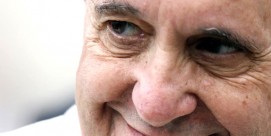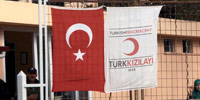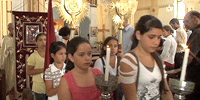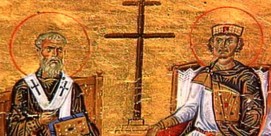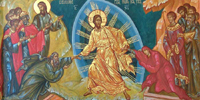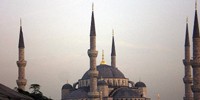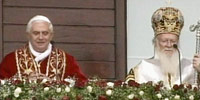KIM LAWTON, correspondent: At the Greek Orthodox Church of the Archangels in Istanbul, Sunday morning worship unfolds as it has for centuries. Christians here say the ancient liturgy and the images that fill the sanctuary help connect them to the roots of their faith. Several books of the New Testament were written in what is now Turkey, and many foundational Christian doctrines were established here.
FATHER VISSARION KOMZIAS (St. George Patriarchal Church): So the presence of the Christianity is from the very, very, very beginning. Here the Christianity starts and never ends.
LAWTON: On this Sunday, presiding over the service is Ecumenical Patriarch Bartholomew, spiritual head of the world’s more than 300 million Eastern Orthodox Christians. Istanbul, once known as Constantinople, is the patriarch’s headquarters. The Christian Church split between East and West in 1054, with Constantinople being the center of Eastern Orthodox Christianity and Rome the center of the Western Church. Leaders of the two churches had virtually no contact for nearly a millennium, but that has changed dramatically in recent years. Ecumenical Patriarch Bartholomew and Pope Francis have met twice prior to this visit.
ARCHBISHOP JOSEPH TOBIN (Catholic Archdiocese of Indianapolis): The fact that already Bartholomew and Francis have greeted each other with great love in Jerusalem and in Rome, this is simply a continuation of it but if you will, it’s on the Orthodox home turf.
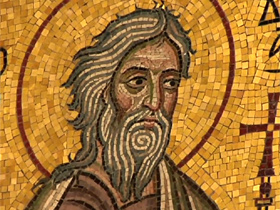 LAWTON: According to Orthodox tradition, Saint Andrew, one of the original 12 disciples, brought Christianity here shortly after the death and resurrection of Jesus. The faith flourished. And in the year 330, when Emperor Constantine proclaimed Constantinople the new capital of the Roman Empire, it became the capital of Christianity as well. The Muslim Ottomans conquered Constantinople in 1453, but the Orthodox headquarters remained located here, in a small compound known as the Ecumenical Patriarchate. The Patriarchate continues to be responsible for the preservation and outreach of the Orthodox faith. From here, the Ecumenical Patriarch provides spiritual leadership to other self-governing Eastern Orthodox jurisdictions around the world. He is considered the first bishop among equals. The Patriarchal Church of St. George contains magnificent reminders of the Church’s glorious past. Off to one side are the relics of important church fathers, including the 4th century theologian St. John Chrysostom. The relics were taken from Constantinople during the Fourth Crusade, and finally returned by Pope John Paul the II in 2004. Metropolitan Elpidophoros is a bishop in the Greek Orthodox Church here.
LAWTON: According to Orthodox tradition, Saint Andrew, one of the original 12 disciples, brought Christianity here shortly after the death and resurrection of Jesus. The faith flourished. And in the year 330, when Emperor Constantine proclaimed Constantinople the new capital of the Roman Empire, it became the capital of Christianity as well. The Muslim Ottomans conquered Constantinople in 1453, but the Orthodox headquarters remained located here, in a small compound known as the Ecumenical Patriarchate. The Patriarchate continues to be responsible for the preservation and outreach of the Orthodox faith. From here, the Ecumenical Patriarch provides spiritual leadership to other self-governing Eastern Orthodox jurisdictions around the world. He is considered the first bishop among equals. The Patriarchal Church of St. George contains magnificent reminders of the Church’s glorious past. Off to one side are the relics of important church fathers, including the 4th century theologian St. John Chrysostom. The relics were taken from Constantinople during the Fourth Crusade, and finally returned by Pope John Paul the II in 2004. Metropolitan Elpidophoros is a bishop in the Greek Orthodox Church here.
METROPOLITAN ELPIDOPHOROS (Bishop of Bursa): East and West are not contradictory to each other. They are part of the same body. And in the last years, thank God, we have extremely good relations.
LAWTON: But some challenges to Orthodox-Catholic unity remain, primarily, disagreements over how much authority the pope should have over the rest of the church. Indianapolis Roman Catholic Archbishop Joseph Tobin leads ecumenical dialogue for the US Catholic bishops.
TOBIN: How does the bishop of Rome relate to the rest of the Christian churches? The Orthodox have a very definite view on it as do the Roman Catholics.
METROPOLITAN ELPIDOPHOROS: The only way we could accept the authority of the pope of Rome in the whole Christianity is the same way it was practiced in the first millennium. He is the authority of a bishop among equals, like it happens in the east.
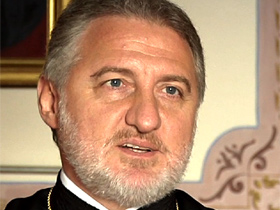 LAWTON: The local Christian presence in predominantly Muslim Turkey has diminished greatly in recent decades. Official statistics suggest there may be fewer than 5,000 Greek Orthodox Christians here. They are free to worship, but face other restrictions. Halki Theological School, the only Greek Orthodox seminary in Turkey, was closed by the government in 1971. And despite strong international lobbying, it has still not been allowed to reopen.
LAWTON: The local Christian presence in predominantly Muslim Turkey has diminished greatly in recent decades. Official statistics suggest there may be fewer than 5,000 Greek Orthodox Christians here. They are free to worship, but face other restrictions. Halki Theological School, the only Greek Orthodox seminary in Turkey, was closed by the government in 1971. And despite strong international lobbying, it has still not been allowed to reopen.
METROPOLITAN ELPIDOPHOROS: It is a direct violation of human rights and religious rights. If you do not open the school, then you violate one of my fundamental rights as a citizen, as a faithful, and as a clergyman.
LAWTON: Church members here hope the visit of Francis will help bolster their community. Many say the images of Francis and Bartholomew embracing one another and praying together will send a strong message.
KOMZIAS: The message is love, unity, co-understanding and probably humility. Because all of us, we are servants of God. We cannot speak about God without love.
TOBIN: It’s a big step toward eliminating the terrible scandal of division. You know, for non-Christians, this is difficult to accept, that how people who hold the same beliefs in the loving action of God in history can live with such a great wound of division.
LAWTON: Muslims involved in interfaith work here believe the pope’s visit will advance their efforts. Fatih Ceran is with the Journalists and Writers Foundation, a nongovernmental organization that promotes peaceful co-existence.
FATIH CERAN (Journalists and Writers Foundation): It is important that prominent leaders set examples for their communities. So coming together of Pope Francis and Patriarch Bartholomew is basically the ultimate meeting in this regard, in terms of interfaith dialogue.
LAWTON: He says given the situation in much of the world, especially surrounding Turkey, that message is needed now more than ever.
CERAN: We’re living at times of conflict, unfortunately, that is, some say, stemming from the religion. I don’t agree. Religions could be contextualized and should be contextualized, actually, to promote peace.
LAWTON: Christians are hoping the visit will encourage those who have been victimized by the rise of extremist violence.
TOBIN: Both Orthodox and Latin or western Christians are suffering greatly, just terrible massacres in Syria and parts of Iraq and in great pressure in Lebanon and other eastern countries. So this sort of solidarity with the national or international leaders with the suffering people will be I think very important.
LAWTON: And for the church here, a visit by the bishop of Rome to the bishop of Constantinople, will be a profound sign of the continuity of Christianity in this ancient land. A continuity they hope will never end. I’m Kim Lawton in Istanbul.

 LAWTON: According to Orthodox tradition, Saint Andrew, one of the original 12 disciples, brought Christianity here shortly after the death and resurrection of Jesus. The faith flourished. And in the year 330, when Emperor Constantine proclaimed Constantinople the new capital of the Roman Empire, it became the capital of Christianity as well. The Muslim Ottomans conquered Constantinople in 1453, but the Orthodox headquarters remained located here, in a small compound known as the Ecumenical Patriarchate. The Patriarchate continues to be responsible for the preservation and outreach of the Orthodox faith. From here, the Ecumenical Patriarch provides spiritual leadership to other self-governing Eastern Orthodox jurisdictions around the world. He is considered the first bishop among equals. The Patriarchal Church of St. George contains magnificent reminders of the Church’s glorious past. Off to one side are the relics of important church fathers, including the 4th century theologian St. John Chrysostom. The relics were taken from Constantinople during the Fourth Crusade, and finally returned by Pope John Paul the II in 2004. Metropolitan Elpidophoros is a bishop in the Greek Orthodox Church here.
LAWTON: According to Orthodox tradition, Saint Andrew, one of the original 12 disciples, brought Christianity here shortly after the death and resurrection of Jesus. The faith flourished. And in the year 330, when Emperor Constantine proclaimed Constantinople the new capital of the Roman Empire, it became the capital of Christianity as well. The Muslim Ottomans conquered Constantinople in 1453, but the Orthodox headquarters remained located here, in a small compound known as the Ecumenical Patriarchate. The Patriarchate continues to be responsible for the preservation and outreach of the Orthodox faith. From here, the Ecumenical Patriarch provides spiritual leadership to other self-governing Eastern Orthodox jurisdictions around the world. He is considered the first bishop among equals. The Patriarchal Church of St. George contains magnificent reminders of the Church’s glorious past. Off to one side are the relics of important church fathers, including the 4th century theologian St. John Chrysostom. The relics were taken from Constantinople during the Fourth Crusade, and finally returned by Pope John Paul the II in 2004. Metropolitan Elpidophoros is a bishop in the Greek Orthodox Church here. LAWTON: The local Christian presence in predominantly Muslim Turkey has diminished greatly in recent decades. Official statistics suggest there may be fewer than 5,000 Greek Orthodox Christians here. They are free to worship, but face other restrictions. Halki Theological School, the only Greek Orthodox seminary in Turkey, was closed by the government in 1971. And despite strong international lobbying, it has still not been allowed to reopen.
LAWTON: The local Christian presence in predominantly Muslim Turkey has diminished greatly in recent decades. Official statistics suggest there may be fewer than 5,000 Greek Orthodox Christians here. They are free to worship, but face other restrictions. Halki Theological School, the only Greek Orthodox seminary in Turkey, was closed by the government in 1971. And despite strong international lobbying, it has still not been allowed to reopen.